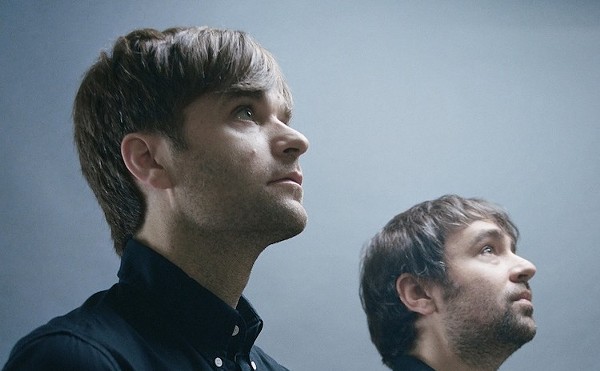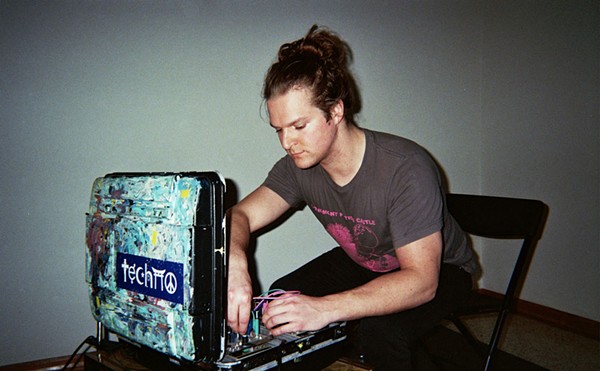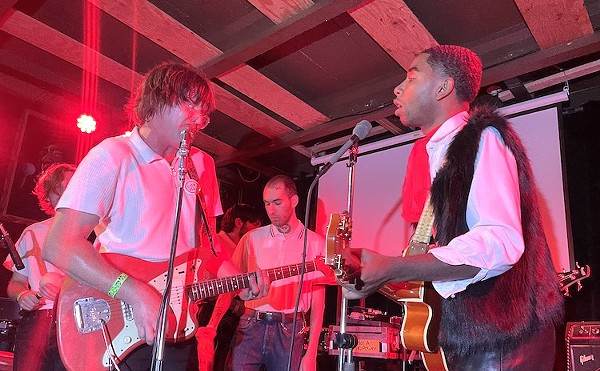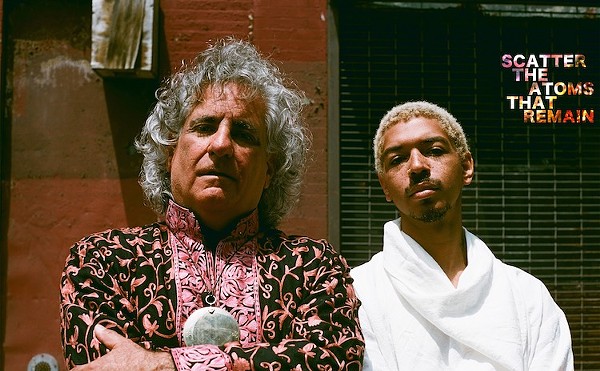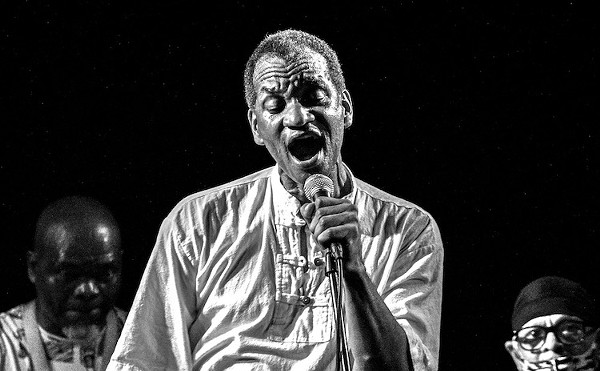"I'm here to demystify anything that I'm doing musically. If somebody sees my stuff and they want to make things that are similar to what I'm doing, I welcome that, I'll talk about it. I love doing that. That's my favorite thing," says Brian Esser, without a trace of irony. "I'm just trying to be a positive influence. I try."
This is not something Orlando Weekly expected to hear from Brian Esser, the Orlando native and mind behind two of the most delightfully strange and mysterious electronic projects from Florida — Yip-Yip and Cabo Boing.
Unlike a lot of electronic musicians along the more experimental spectrum who conceal techniques like trade secrets, Esser is happy to yank the curtain back, à la the Wizard of Oz. Cabo Boing's tools are open source.
Orlando Weekly did ask many things, and the result was an honest conversation with an elder statesman of Floridian weirdness. To get to Cabo Boing, you have to start with Yip-Yip.
Yip-Yip, the duo of Brian Esser and Jason Temple — concealed behind homemade checkerboard costumes and wreaking havoc with all manner of archaic electronic gear Frankensteined together — rampaged across Orlando stages large and small (including libraries and kids' birthday parties) and released deeply strange synthesized earworms for a too-brief period in the early 2000s, until the band dissolved in 2013. They left many delightfully warped young musical minds in their wake.
The double loss of his band and, in the fallout, his best friend, left Esser reeling. It's something that he still reckons with today. "I've never really gotten over Yip-Yip breaking up. This is definitely one of the hardest things ..." Esser pauses. "It's still hard."
Some small relief would eventually come in the form of rock history. "In my defense, I don't remember any older people in my life — whether it be parents or older friends or whatever — being like, 'You know, most bands break up by the time they're in their 30s,'" he says wryly.
But there was no question of Esser giving up music. Things would just have to be very different from then on. "I did feel the need to carry on, and I felt like playing solo was a very good idea as far as I just couldn't imagine having a connection with someone like that again," says Esser.
Esser slowly began a creative do-over to find his own solo voice, and much of that gestation period happened while he lived in New York City for a few years. He experimented with new equipment, new processes, new techniques, new costumes.
And the result was Cabo Boing.
Imagine a hybrid of the Residents, Devo and the parts of Pee Wee's Playhouse where everyone shouts the "secret word" at once — with a dash of ska fandom. It's a synthesis of all of Esser's musical and visual obsessions into a heady, mind-twisting brew. And you can dance to it. Kind of.
2017, Esser and his wife, Rachel, had moved back to Central Florida. Cabo Boing had a freshly completed debut album, Blob on a Grid, and a live set he was eager to share on his home turf. He found a new generation of Orlando musicians who cited Yip-Yip as a formative musical experience, and were eager to welcome back such an essential influence.
Esser started playing shows and even toured, enthusiastically plugging into this new creative community. And then the pandemic happened.
So with nothing but time on his hands, Esser went back to work on new music, initially started back in 2019. It would be a slow process.
"With my stuff, there's always ideas that I'll try and they sometimes work and sometimes they don't. And it's finding this balance between 'meticulous good' and 'meticulous bad,'" says Esser. "If I place too many rules on myself or too many processes that I want a thing to go through, I will hit a point where I just get lost."
Listening to an interview with cult 1980s British duo Renaldo and the Loaf provided both inspiration for new songwriting processes ... and a cautionary tale.
"They talked about using dice-rolling to pick how many instruments would be in a song," says Esser.
He then explains how even that innocent chance operation quickly went awry.
"If I take it just a little bit. How about I use part of this idea — the idea of randomizing samples — and grab 20 samples at random and put them in a folder and be like, 'OK, make a song with this.' That's a good one. And then a bad one is: 'Let's go as far as they went or even go further. Let's dice-roll literally everything' — time signatures, how many changes, blah, blah, blah."
Eventually though, the album would be finished. And not to sound flippant, but Real Gems for Little Jewels, out in March through New York's Haord Records, was worth Esser's creative sweat and tears.
Real Gems is full of gloriously, head-swimmingly eccentric musical twists and turns that somehow exist harmoniously with earworm hooks rendered through a maze of analog electronics. It's Esser's most accomplished solo statement to date. And maybe, just maybe, he feels the same way.
"I wouldn't dare say everything on the album is good. It's not," says Esser. "But there are whole songs and hopefully in just about every song I did something that I think is like 'Oh, I did it. I made music that I would listen to if it wasn't me.'"
A chance visit to a rundown flea market in Myrtle Beach led to the discovery of the cover image of a gleeful clown licking an ice cream cone. "Nothing made me happier than finding that image on that door," says Esser. "It's just the joy that comes over me to find something that's kind of terrifying and funny at the same time, and a bit surreal."
So that brings us to the present day. The clown-festooned Real Gems is in the world. Esser is a Gainesville resident and even played his first show there recently. He also played a hometown album release show with young peers AOL, Algae Guck and KT Kink — and with Jimmy Schaus of Skeleton Warrior screening short films to kick off the night.
Having Cabo Boing back on the live circuit is a good thing. It's a thrillingly off-kilter experience, yet very different than a manic Yip-Yip performance. Esser still cops to feeling the same crushing anxiety previous to every show, which he mitigates somewhat by costume concealment — once resembling a sinister cybernetic Dr. Zoidberg.
"I have to be covered," reflects Esser. "But costumes are hard. Devo has done just about every good idea you could think of in every color."
Esser plays an odd headless guitar, patiently turns dials on a case of electronic musical ephemera, and even sings (though heavily processed) on most numbers. Cabo Boing is like a nightclub act from a long-lost sci-fi B-movie. Esser has trouble not dissecting his performances.
"I was reading an interview with Danny Elfman about playing Coachella ... and he kept going, 'Yeah, yeah, it's awesome. But I can't wait for next week because we're doing a second show next weekend. And you know there were sound difficulties, and I'm trying not to focus on that too much. But ...' And to hear that, it's just like, wow. You could do this at any level and you want so badly to be better."
He's also ready to close the book on Real Gems and move forward.
"Getting through the whole album cycle — writing a song, writing an album, getting on a label, playing shows and playing those songs, selling those albums and then starting all over again — I've done that now. Many, many times.
"And every single time when I'm done, I'm like, 'All right, let's do it again.' I can hardly put it in words, the feeling that I get from that accomplishment and I'm always so scared as I'm doing it ... 'Oh no. What if this is a bad turn?' I think about bands I like from the '80s and they'd put out a bad album and nobody would like them anymore. What if I'm making that album?"
Despite having to face down his creative anxieties and self-doubts on a daily basis, Esser feels some small degree of comfort being back enmeshed in Florida's swampy underground.
"I love being back in Florida where longevity is kind of encouraged. I've always felt comfortable here. I love being able to freely not be cool, and make uncool music, but yet somehow feel cool at the end of the day because people still want to be my friend," says Esser. Here's to many more years of uncoolness.





